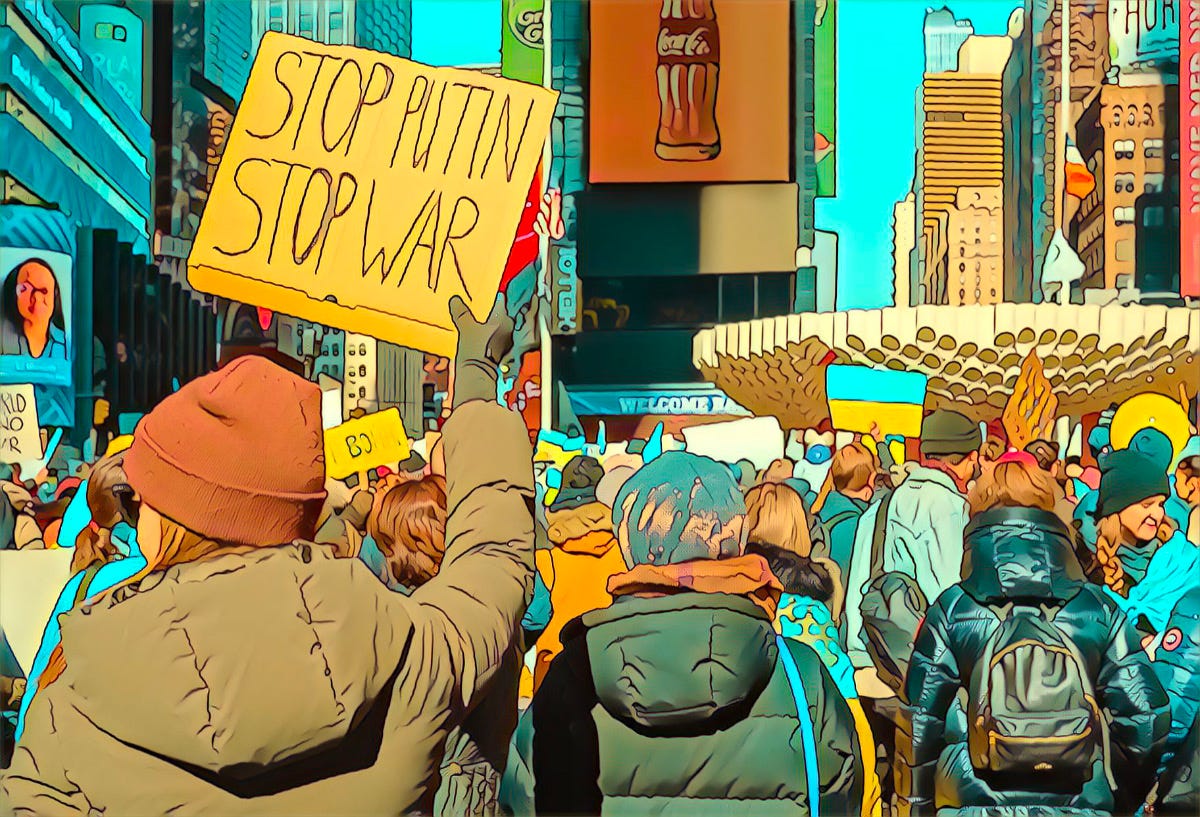Jessie Daniels is back with an explanation for why we so quickly attach our emotions to Ukraine while feeling dissipated and uneasy here at home.
by Jessie Daniels
The war began on a Wednesday in February half a world away and we watched it unfold in real time. In an era of taking what you want, the sample size strongman of Russia wanted Ukraine, so he sought to take it. Updates by the second confirmed the warnings we’d heard for weeks. Suddenly there were no longer any semantics about what constitutes an invasion. This is what an invasion looks like.
Just like that, the gloves came off, the masks came off, folks started Googling “oligarch yacht seized” and the President found a pivot. After a year spent trapped in a tangled government-works-(except-when-it’s-stalled) narrative, he was able return to the one that brought him to the dance: the battle between democracy and autocracy. That’s why Ukraine matters. We are both democracies, unified against an autocracy.
Replacing the misplaced patriotism of isolation with a reaffirmation of the Western alliance is a fitting balm for the moment. It undergirds the domestic narrative that an America unified can counter snapshots of doom and grievance and hate that provide fertile breeding ground for authoritarianism to bloom here. There is strength in unity and there is unity in strength. As the presidential pep talk went: “The State of the Union is strong because you, the American people, are strong.”
The strong are not okay, though. Something changed this past year, even with the hope of the vaccine and a return to normal. Maybe it was the not knowing whether to send your kids back to school as a new wave of the virus hit or the not knowing how you got COVID despite being fully vaccinated and boosted or the not knowing when this would end. Maybe it was the not knowing what normal would even look like anymore. The cloying uncertainty of it all chipped away at us little by little, like illegal annexations of our resilience – even among those who seemed most up to the task of standing tall in the face of a virulent enemy.
Strangely, surviving the endemic phase of this virus feels different than surviving the pandemic in terms of having an acute sense of purpose. “I had a mission when the pandemic started,” a friend said. “I had to keep my family safe, keep my business afloat. I’ve done that. Now, I don’t know.”
It’s hard, the not knowing.
This week, on the PBS Newshour, a Ukrainian man in Kyiv expressed similar sentiments about the new clarity of mission sparked by an unprovoked war:
“What is absolutely incredible is how quickly all of us just simply, y’know, changed their normal way of being. I have, y’know, I have a regular job, like everyone else, which I go to 9 to 5, I travel a lot, I do a blog about heavy metal music for myself, yet all of these things just suddenly became absolutely unimportant, and you understand that the only thing which is important to you is the safety of your family, first, and then the safety of your country.
So much foreign policy talk to this point had been about getting back to the way we were. We would get back in the Paris Climate Accords. We would get back in the Iran Deal. We would get back to normal – as if the world had just taken a hiatus, but don’t worry, we’ll return to your regularly scheduled programming after this. There’s comfort in the familiar, but there’s also a dissonance to rallying around what was when everyone is dealing with what is.
What’s old is new with Ukraine too, with the “new Cold War” frame trying to make sense of it. But embracing the resolve of a country suddenly fighting for its very existence also has an updated resonance in this moment: it’s an opportunity to be strong again. In different ways – from rallying in the streets to wearing blue and yellow in the House Chamber – there’s unity in the shared identity of strength and renewed purpose in knowing who and what you need to fight for.
Clarity of mission also assumes clear endings – triumph or defeat. You know, at least.
But as many Ukrainians also know, this war didn’t just start last month; it’s been simmering in the Eastern Ukrainian region of Donbas for the past eight years. In Ukrainian novelist Serhiy Zhadan’s The Orphanage, set in that chaos and carnage, there’s a scene where the main character asks a woman if she has seen someone he is looking for.
“I’m just worried about her. I want to find her when this is all over,” he adds.
“What makes you think that all of this is going to end?” she asks.
“Well, it has to end at some point.”
“You think so?”
It’s hard, the not knowing.
Jessie Daniels is a policy professional and writer based in New York. Daniels previously worked in the U.S. Senate as a national security legislative aide to Majority Leader Harry Reid. Daniels writes frequently on foreign policy and political issues. Her writing has been published in outlets including The Guardian, The Orlando Sentinel, and The San Francisco Chronicle. This is her fourth piece.



